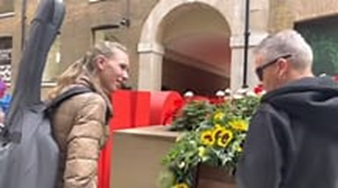--------oOo--------
One of the things I like to do to relax is to watch items on YouTube that my family consider a total waste of time: garden makeovers with Tm the Lawnmower Man, the campaign in Russia by activists trying to prevent ill mannered drivers using sidewalks to bypass traffic, park etc in Stop a Douchebag SPb, magnet fishing with Bondi Treasure Hunter, woodturning tree roots into bowls . . . and so on.
One such series of videos is by Brendan Kavanagh, playing public piano. Example:
According to Wikipedia:
Brendan Kavanagh (born 1967), also known as "Dr K" due to his PhD in English, is a British pianist and piano teacher of Irish descent. He specialises in playing and promoting the boogie-woogie genre, almost exclusively improvised, often combined with classical, jazz, blues, rock & roll, and traditional Irish music themes. He regularly performs in open venues on public pianos, sometimes in duet formats with musically inclined passers-by or friends. He also plays the piano accordion, with emphasis on traditional Irish tunes.
--------oOo--------
I was watching some videos when a random Dr K video popped up. It was headed Guitar Girl Shocks Boogie Woogie Pianist and I was entranced watching it. Dr K invited her to join him and this is what happened.
I will offer no comments until you watch the video:
No microphone, no special recording equipment and no special effects or orchestra, on the street in the open air, so pure and so beautiful.
What are your views and comments?
--------oOo--------
Which started me wondering about the background to Ave Maria and what the Latin lyrics mean in English.
--------oOo--------
Background:
From Songfacts:
The original words of Ave Maria (Hail Mary) were in English, being part of a poem called The Lady of the Lake, written in 1810 by Sir Walter Scott (1771-1832). The poem drew on the romance of the legend regarding the 5th century British leader King Arthur, but transferred it to Scott's native Scotland.
In 1825 during a holiday in Upper Austria, the composer Franz Schubert (1797-1828) set to music a prayer from the poem using a German translation by Adam Storck. Scored for piano and voice, it was first published in 1826 as "D839 Op 52 no 6." Schubert called his piece "Ellens dritter Gesang" (Ellen's third song) and it was written as a prayer to the Virgin Mary from a frightened girl, Ellen Douglas, who had been forced into hiding.
The song cycle proved to be one of Schubert's most financially successful works, the Austrian composer being paid by his publisher 20 pounds sterling, a sizable sum for a musical work in the 1820s. Though not written for liturgical services, the music proved to be inspirational to listeners, particularly Roman Catholics, and a Latin text was substituted to make it suitable for use in church. It is today most widely known in its Latin "Ave Maria" form.
In a letter from Schubert to his father and step-mother he writes about "Ave Maria" and the other songs in his "Lady of the Lake" cycle:
"My new songs from Scott's Lady of the Lake especially had much success. They also wondered greatly at my piety, which I expressed in a hymn to the Holy Virgin and which, it appears, grips every soul and turns it to devotion."
In the UK two versions of "Ave Maria" have reached the Top 40, Shirley Bassey peaking at #31 in 1962 and Lesley Garrett and Amanda Thompson reached #16 in 1993.
--------oOo--------
Lyrics:
Latin lyrics:
Ave Maria, gratia plena,
Maria, gratia plena,
Maria, gratia plena,
Ave, Ave, Dominus,
Dominus tecum.
Benedicta tu in mulieribus, et benedictus,
Et benedictus fructus ventris (tui),
Ventris tui, Jesus.
Ave Maria!
Sancta Maria, Mater Dei,
Ora pro nobis peccatoribus,
Ora, ora pro nobis;
Ora, ora pro nobis peccatoribus,
Nunc et in hora mortis,
In hora mortis nostrae.
In hora, hora mortis nostrae,
In hora mortis nostrae.
Ave Maria!
English translation:
Hail Mary, full of grace,
Mary, full of grace,
Mary, full of grace,
Hail, Hail, the Lord
The Lord is with thee.
Blessed art thou among women, and blessed,
Blessed is the fruit of thy womb,
Thy womb, Jesus.
Hail Mary!
Holy Mary, Mother of God,
Pray for us sinners,
Pray, pray for us;
Pray for us sinners,
Now, and at the hour of our death,
The hour of our death.
The hour, the hour of our death,
The hour of our death.
Hail Mary!
--------oOo--------
By the way . . .
Boogie Woogie is a style of blues music, with close links to jazz forms like ragtime and stride, usually played on the piano.
The origin of the term 'boogie-woogie' is uncertain. The most likely explanation is that it is a reduplication of 'boogie', which was the name given to a rent party in early 20th century USA. These parties were impromptu affairs, set up (pitched) to raise money to pay rent, at which a small entrance fee was charged. Brian Rust, in his exhaustive directory of recorded jazz music - 'Jazz Records 1897-1942', records this line from a 1929 piece: "We're gonna pitch a boogie right here."
--------oOo--------


No comments:
Post a Comment
Note: Only a member of this blog may post a comment.